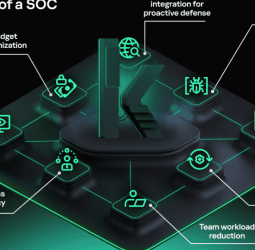In recent years, the digital transformation has been accelerating at a rapid pace, bringing both innovation and vulnerability. Against unprecedented development of technologies in almost every field, the world of cyberthreats is evolving at the same high pace and becoming more sophisticated every day. Attackers are skillfully exploiting interest in new trends and use emerging technologies — with almost every other organization thinking that the majority of recently experienced attacks were AI-driven, which enables them to constantly widen the victim pool.
In this high-risk environment, organizations race to secure their infrastructure across the board. And here comes the question of the preparedness of their employees — not only dedicated information security teams, but staff in general — for tackling this reality. With digital literacy turning indispensable for the operations of any organization, there is a need to make cyber knowledge more accessible.
This is where the main floor goes to universities, which play a key role in preparing the workforce with a relevant skillset. Whether it’s a student of any technical discipline — from engineering and robotics to data science — or a human sciences graduate, cybersecurity knowledge is no longer optional. Despite this, cybersecurity remains a rare guest in official curriculums, and many universities offer such knowledge solely for information security students. Graduates might be leaving higher institutions with strong technical skills, but still lack the security skills, unknowingly putting data, systems, and business processes at risk.
According to Dr. Dayananda P., the Professor & Dean at School of Computer Engineering at Manipal Institute of Technology (MIT) in Bengaluru, introducing cybersecurity into the curriculum significantly enhances both professional and personal capacities of the students. "Professionally, it prepares them to anticipate, detect, and mitigate threats, which are highly valued skills in today’s job market. Personally, it instills a sense of digital responsibility and awareness that carries over into their daily lives, making them more secure and resilient digital citizens," comments Dr. Dayananda P.
Addressing the weakest link in cybersecurity through early education
Despite technological advances, human factor remains one of the leading cause of breaches. Phishing, social engineering, and poor cyberhygiene continue to be exploited. In 2024, Kaspersky reported 900 million phishing attempts worldwide, which is a 26% increase compared to the previous year and a sign that social engineering is a mainstay for cybercriminals. Disregard to cybersecurity concepts in curricula leaves future engineers, developers, and business analysts ill-equipped to recognize and mitigate risks targeting their future employers, whether it be a start-up or a large enterprise.
Today, professionals from diverse fields are actively working with data and are increasingly relying on digital platforms to perform their duties, and the digital sustainability of the corporate world is directly related to the security knowledge of its employees. By offering comprehensive cybersecurity training and embedding such courses early in academic journeys, universities can ensure that students develop a security-first mindset — a vital asset in any modern workplace. By producing strong workforce, universities in a way contribute to global cyber sustainability, developing community, which can manage digital dependence and safeguard against emerging risks with confidence.
"The growing reliance on digital systems across every sector makes it critical for engineers and technologists to be well-versed in securing data, applications, and networks," adds Dr. Dayananda P.
Better compliance and security, lower costs
By hiring cyber aware employees, business can ensure better compliance of all its processes, especially those, related to working with data. Today, to stay compliment, organizations have to adhere to all relevant laws and regulations, develop internal policies and procedures, perform regular risk assessments and audits, and have established processes for threat monitoring and reporting. Cultivating cyber literacy among future graduates, universities produce employees that can help their future employers ensure that relevant processes are established in a proper way, which in a long term can reduce financial costs, stemming from potential compliance violations and respective fines.
Additionally, as future employees, cyber aware students also contribute to company's overall security level, avoiding mistakes that create loopholes for cybercriminals:
Career mobility
According to a recent report, digitalization, artificial intelligence, and rising longevity are transforming traditional career paths and influencing a shift towards more fluid and diverse career trajectories. Career mobility is turning into a significant and increasing trend and we see people actively changing professions. For employers, internal transfers are also beneficial due to a lower financial and time cost compared to external recruitment processes.
Amid acute shortages of cybersecurity professionals, basic cybersecurity knowledge can provide inspiration to experts of other disciplines to embrace the information security profession within its organization, and respective courses and certificates may come in handy.
Dr. Dayananda P. highlights that the curriculums of technical specialties at the Manipal Institute of Technology already include a diverse set of cybersecurity-related disciplines ranging from cryptography to ethical hacking. This enables students to test their skills as part of prestigious hackathons and Capture-the-Flag (CTF) competitions, contribute to industry-led projects and even publish research on the topic.
Personal awareness
Finally, basic cyberhygiene may help students to resist a wide range of risks in daily live: from security of personal accounts and financial transactions to timely recognition of scams and fraudsters. With a rise in a range of phishing and scam schemes, security knowledge will save students time, money, and, more importantly nerves.
Turning challenge into preparation
Cyberthreats aren’t slowing down and in this environment, by implementing cybersecurity programs, universities help their students resist emerging digital risks, get forward-thinking education and the skills needed to succeed in all industries.
Moreover, against the rapidly evolving threat environment is not excluded that the subject of cybersecurity will soon become mandatory for students of all specialties. Introducing cybersecurity courses now, universities can become pioneers in setting new training standards.
Introducing ‘Cybersecurity: Entry Level’
To address students’ cybersecurity knowledge gap, Kaspersky Academy has developed ‘Cybersecurity: Entry Level’ – a free online course on cybersecurity concepts awareness. Delivered through short video lessons by Kaspersky experts, the course aims to engage students in cybersecurity regardless of their major. Designed for first- and second-year students, it offers a structured introduction for students from all technical and even non-technical backgrounds, helping them to stay resilient and sustainable on both personal and career level.
‘Cybersecurity: Entry Level’ is available for members of Kaspersky Academy Alliance - a partnership program for universities to integrate the cybersecurity expertise and the latest Kaspersky technologies into teaching. The course can be easily implemented into a university educational program through its learning management systems by request.



 Natasha
Natasha






